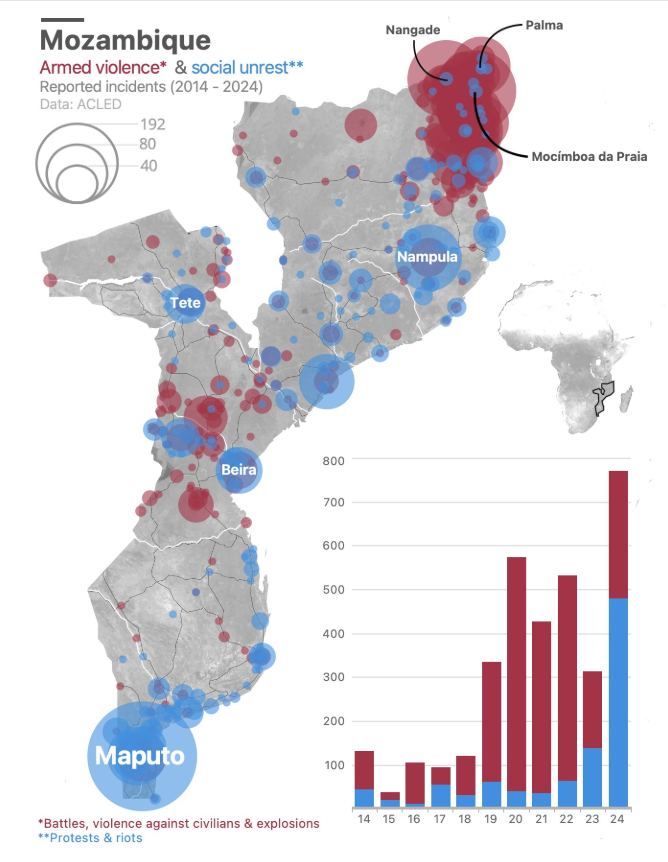Mozambique Unrest: What’s Happening After Police Crackdown on Opposition?
Mozambique is once again at a crossroads as unrest grips the nation following a violent police crackdown on an opposition march in the capital, Maputo. On March 5, 2025, security forces opened fire on supporters of opposition leader Venâncio Mondlane, injuring at least 14 people, including two children, according to civil society group Plataforma Decide. The opposition leader’s whereabouts remain unknown, intensifying fears of escalating political turmoil in this Southern African country. This developing story carries high emotional stakes and profound implications—not just for Mozambique, but for stability across the region. So, what’s really happening, and where is this unrest headed?
Tanjir Hossain Sakib | africannews.online
3/7/20252 min read

A Violent Turn in Maput
The latest clash erupted when Mondlane, the runner-up in the disputed October 2024 presidential election, led a caravan to promote his newly formed political party. Eyewitnesses described the police response as an ambush, with live ammunition and tear gas unleashed on protesters. Video footage circulating online captured the chaos—gunshots ringing out as demonstrators scattered in panic. Mondlane’s team alleges that the crackdown was a deliberate attempt to silence dissent, a claim that resonates deeply in a nation still reeling from months of post-election violence.
This isn’t an isolated incident. Since the October 9 election, which saw Frelimo’s Daniel Chapo declared the winner with 71% of the vote, protests have rocked Mozambique. Mondlane and his supporters insist the election was rigged, pointing to irregularities flagged by international observers. The government denies these accusations, but the numbers tell a grim story: over 350 deaths and 3,500 injuries have been reported in demonstrations since late October, per local monitoring groups. The March 5 crackdown only adds fuel to an already blazing fire.
The Roots of Mozambique’s Political Tensions
To understand this unrest, we must look back. Mozambique’s ruling party, Frelimo, has held power since independence from Portugal in 1975, a 50-year reign marked by accusations of authoritarianism and electoral fraud. The 2024 election was meant to be a democratic milestone—the first without armed political militias after a disarmament process—but instead, it reignited old wounds. The assassination of two senior opposition figures in October 2024, followed by nationwide internet shutdowns and violent protest suppression, set the stage for today’s crisis.
Mondlane, a charismatic independent candidate backed by the PODEMOS party, has emerged as Frelimo’s fiercest challenger. His exclusion from recent government talks—culminating in a March 5 agreement with other parties to review electoral laws—has only deepened the divide. Analysts warn that sidelining him risks undermining any hope of stability. “The longer it takes to include Venâncio, the worse the chances of stabilizing the situation,” political analyst João Feijó told Reuters.
What’s at Stake for Southern Africa?
Mozambique’s unrest isn’t just a domestic issue—it’s a regional alarm bell. The country’s strategic location, rich natural gas reserves, and proximity to South Africa make it a key player in Southern Africa. South Africa has already closed its main border crossing with Mozambique due to security concerns, while companies like Grindrod have suspended port operations. If the violence escalates—some fear it could spiral into civil war—the economic and humanitarian fallout could ripple across the region.
The international community is watching closely. Human rights groups like Amnesty International have condemned the police crackdown, calling for investigations into reported killings and abductions. The Southern African Development Community (SADC) and African Union face pressure to intervene, but their silence so far has frustrated many Mozambicans.
Where Do We Go From Here?
As of March 7, 2025, the situation remains fluid. Mondlane’s location is unknown, raising speculation about his safety or plans for retaliation. President Chapo, meanwhile, has labeled the opposition’s actions a “dictatorship” and warned of economic sabotage, signaling no retreat from the government’s hardline stance. With protests showing no sign of abating, Mozambique stands on the brink—caught between demands for democracy and the weight of its political past.
What do you think? Is Mozambique’s government justified in its response, or is this a tipping point for governance in the region? Share your views in the comments below—we want to hear how this unrest is resonating with you, wherever you are in Africa and beyond.
Stay tuned to africannews.online for the latest updates on Mozambique unrest and more breaking stories across the continent.


Mozambique Unrest | African News
Connect
Stay updated with Africa's vibrant stories today.
Explore
Discover
© 2025. All rights reserved.
